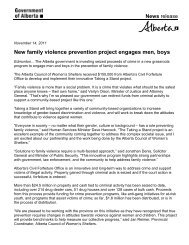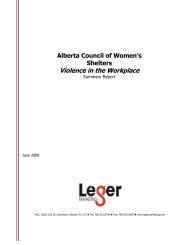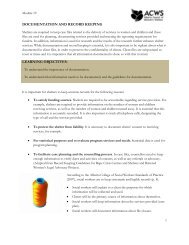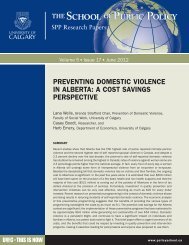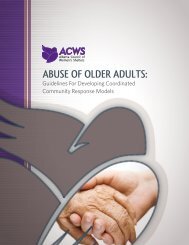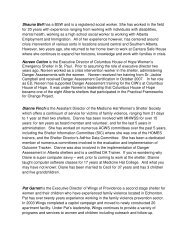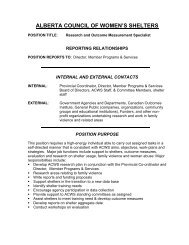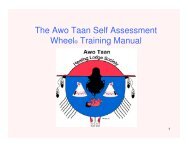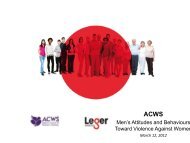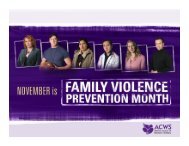Global Data Count Results - Alberta Council of Women's Shelters
Global Data Count Results - Alberta Council of Women's Shelters
Global Data Count Results - Alberta Council of Women's Shelters
- No tags were found...
Create successful ePaper yourself
Turn your PDF publications into a flip-book with our unique Google optimized e-Paper software.
<strong>Shelters</strong> and other services may struggle to meetthe needs <strong>of</strong> diverse communities. Not allshelters have staff trained in the complexities <strong>of</strong>refugee and immigrant issues. They lackresources and expertise to ensure that they arefully accessible and able to provide culturallysensitive and relevant supports.Morocco: I am scared and worried, my husbandis dangerous. I don’t speak French, how can Icommunicate with other women.The women and children who reached out tous had complex needsMany countries reported significant mentalhealth issues amongst women using shelters.Respondents felt that the mental health issuesadded another level <strong>of</strong> complexity and challengeto an already difficult situation (Taiwan, USA,Australia and Denmark). Respondents alsosuggested an increase in the number <strong>of</strong> mentalhealth disorders in women visiting their shelters(Germany, Canada).Canada: We are seeing more and more acuteco‐occurring disorders such as PTSD, mentalhealth issues and addictions.USA: People are forced to stay in abusiverelationships due to a lack <strong>of</strong> those resources.Nepal: I was mentally disturbed when broughtto shelter. I didn't know what to do. I was avictim <strong>of</strong> rape. The rapist had already flown to aforeign country. My family started behavingawkwardly after I was raped. They used totorture me day and night. Later, after I gavebirth to child, I was driven away from home.When I was in dire need <strong>of</strong> support from myfamily, I was deserted. Dejected and discarded Iwas wandering here and there not knowingwhere to go.Women faced barriers transitioning backinto communityIn many countries (Canada, Australia, USA,Austria and Sweden) shelters identified howwomen face difficulty transitioning back intocommunity due to a lack <strong>of</strong> affordable housingand shelter. The lack <strong>of</strong> housing created theimpossibility <strong>of</strong> “exit points” and an inability tomove out <strong>of</strong> the shelter. This can strain ashelter’s already taxed resources.Costa Rica: "I need an employment",…"stablework because once we're over a certain age,they won't hire us anymore", …"a safe place tolive", …"houses or apartments are above theprice”, … "I need financial help to get food andeverything my children need."Australia: Women become stuck in refuge andwe have done all we can do, now just waiting forhousing. No new women can access bedsbecause no movement is happening.How we helpedCanada: The Crisis Worker's were amazing.They were always there for me, even when Ididn't realize I would need them. Every minute <strong>of</strong>support that they <strong>of</strong>fered was priceless to mygrowth. They have an uncanny sense for when aperson needs a kind word or hug or even alonetime.Beyond the basics <strong>of</strong> safety, security, andemotional support, the women who came to theshelters mentioned repeatedly the importance <strong>of</strong>our programs and services. Many <strong>of</strong> the womencited personal development and growth in selfesteem;that they were encouraged andempowered to move forward. The education andcounseling programs were a very important part<strong>of</strong> their shelter experience.<strong>Global</strong> <strong>Data</strong> <strong>Count</strong> 2012 4



